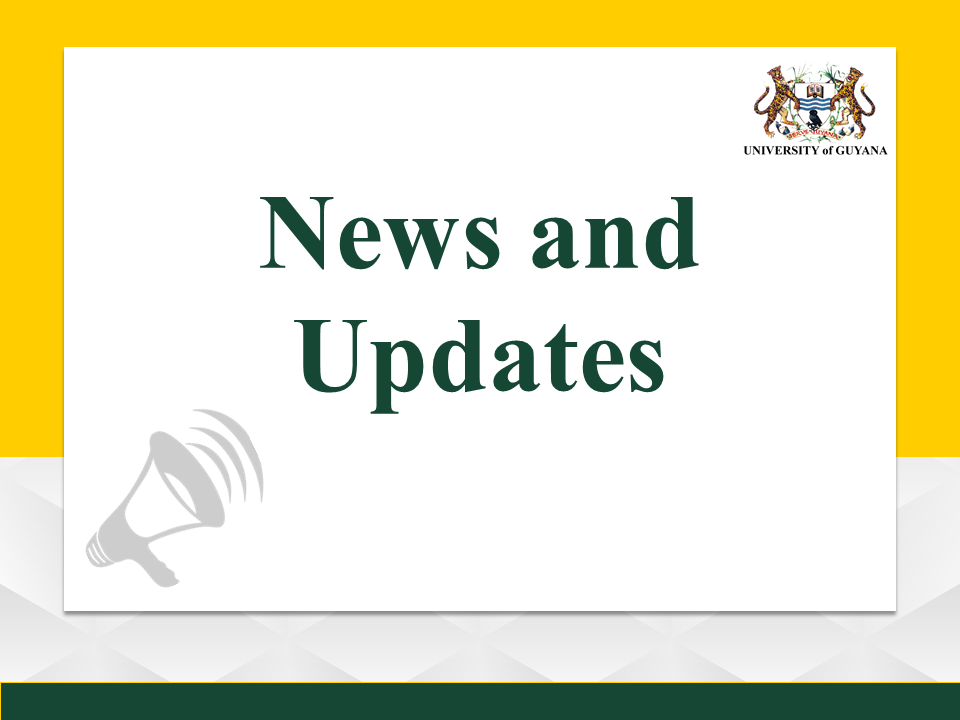
UG Rehabilitation programme graduates few, but too crucial to health care to discard - Health Sciences Dean
Monday, June 26, 2017 - 13:52
Although they are not named among the most popular programmes offered, those that fall under Medical Rehabilitation at the University of Guyana [UG] are no less important, especially when they suffer from conditions that limit the effective functioning of various aspects of their anatomy.
The knowledge gained from courses such as Bachelor’s Degrees in Physiotherapy, Speech-Language, Audiology and Occupational Therapy have long been found to be very instrumental in this regard.
It was against this background that the Rehabilitation Department of the Ministry of Health decided to collaborate with UG a few years ago to realise the Medical Rehabilitation programme. Thus far, the programme, which falls under the purview of the Faculty of Health Sciences, has graduated two batches consisting of not more than 12 individuals.
According to Dean of the Faculty of Health Sciences, Dr. Emanuel Cummings, although the numbers are few, offering the Medical Rehabilitation programmes is still very relevant. He noted that while it was introduced as a general Rehabilitation Services Degree, the university with the support of the American Speech-Language- Hearing Association [ASHA], was able to apply some modification touches.
Under the broad heading of Medical Rehabilitation, the Rehabilitation Services programmes are coordinated by Dr. Shaine Villareal of the Philippines. The programme has also been gaining immense support from Peace Corps Guyana which has been bringing to Guyana very experienced professionals to assist with lecture sessions.
Also, local doctors who were trained in Cuba, and elsewhere, have also been lending lecture support. Other trained professionals within the public health sector have also been contributing their services.
Despite the high quality of the programme being offered, Dr. Cummings admitted that very few persons are attracted to the programme. He, however, attributed this to the fact that “these [programmes] are all new health care profession training [at an advanced level] to Guyana.” He explained that the Ministry of Health, several years ago, only offered such training at a certificate level.
The certificate programmes were offered for a period of 18 months and allowed persons to be trained in the various areas of rehabilitation services. Once completed these individuals would be qualified at the Assistant level and employed within the public health sector throughout the country.
However, with the higher level training at UG, the health sector is now in a position to recruit more qualified persons to cater to its delivery of rehabilitation services, according to Dr. Cummings.
Among those who have already taken advantage of the programme is Christine Alphonso. The ambitious young woman revealed that even after she had commenced studies at UG in the area of Biology she was not aware that the institution was offering a programme such a Medical Rehabilitation.
She confided that her interest in sports would have undoubtedly caused her to be attracted to the programme had she been aware of its existence. Moreover, when she learnt of the programme through a friend, Alphonso said that she immediately made a switch. She chose to pursue training in Physiotherapy and last year graduated among the second batch of students to have completed UG’s Medical Rehabilitation programme. She passed with distinction.
Alphonso is currently a Physical Therapist attached to an arm of the Rehabilitation Department of the Ministry of Public Health which is located at the Brickdam, Georgetown Palms Geriatric Home.
It was rather simple to enter the programme, according to Alphonso, who explained that once persons would have attained success at the Caribbean Secondary Education Certificate examination, complete with Mathematics, English and a Science Subject, they can apply for the programme.
“I wanted to do this [physiotherapy] because I like sports a lot but I really didn’t realise that the rehabilitation programme entailed so much. You can help not just athletes or persons with sports related injuries but now I can even help people who suffer from stroke, arthritis, spinal cord injury and a lot of other conditions…once you have a limitation in movement you are referred for therapy and people really can get better,” asserted Alphonso.
She finds joy offering therapy to the several persons she has been assigned since joining the department in January.
Recruiting persons, such as Alphonso, back into the public health care system is indeed among the objectives of the programme, according to Health Sciences Dean.
“The programmes we offer are geared at improving the quality of life for persons who have a disability so that they can be incorporated back into society so if we are able to train one person and put them to work in audiology, for instance, that is a jack pot for us….there was a time when we didn’t have anybody.”
The Dean said that UG will be working in close collaboration with organisations such as ASHA to have some of its very successful graduates have access to even more advance training.
Dr. Cummings hopes that more persons will gravitate to the programme so that they too can benefit from training that can ultimately help to improve the delivery of service offered locally.
The Dean is convinced that with proper career guidance more students could be aware of the variety of programmes offered, not only at the vanguard faculty, but at faculties throughout the university.
Article adapted from: http://www.kaieteurnewsonline.com/2017/06/22/ug-rehabilitation-programme-graduates-few-health-sciences-dean/
